We are delighted to announce the shortlists for the 2020 Michael Marks Awards for Poetry Pamphlets
Winners were revealed during an online event on Monday December 14th
Poetry Award Shortlist
Alycia Pirmohamed, Hinge, ignitionpress
Gail McConnell, Fothermother, Ink Sweat + Tears Press
Sarah Wimbush, Bloodlines, Seren
Paul Muldoon, Binge, The Lifeboat Press
Jamie McKendrick, The Years, Arc Publications
The Michael Marks Poetry Award Shortlist
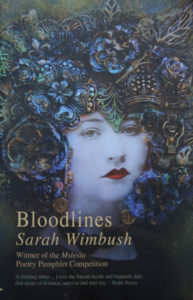
Sarah Wimbush – Bloodlines (Seren)
Judges’ Comments
Linguistically and formally inventive, Sarah Wimbush’s Bloodlines evokes the world of Gypsies and Travellers, a vital and intensively lived world at once harsh and earthy, exuberant and exotic. A plethora of voices punctuates the sequence as the reader is invited to connect imaginatively with customs, traditions and communities known at first hand by their chronicler and creator. This is an exciting debut pamphlet thrumming with humanity and with the mystery and joy of being alive.
Meat Puddin’
Take shin, kidney, an onion. Dice.
Cradle beef suet in your palm; shred
into flour with Daddy’s rabbit knife
lace-edged with rust. Add spring water.
Pullt goo into a ball.
Roll into a circle with a besom end.
Scoop the mas and press onto the dough.
Gather like a pack-up. Flute the rim
with a lick of ale to seal together.
Gi the dumplin’ skin a slap.
Turn onto a floured pudding cloth.
Tie a double knot. Slide into the cauldron,
water thrilling over scavenged vonga,
one eye on the blip-blip-shudder till dusk.
Lift puddin’ arht b’t knot. Untie.
Ease the moon into an Imari bowl
haggled to a farthing from Black’s pot barrow
on Retford market. Cut into a clock.
Add cooking liquor and salt —
n’ then lass, eat wi carrots, tatties, swede.
mas meat; vonga coal
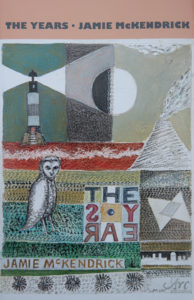
Jamie McKendrick – The Years (Arc Publications)
Judges’ Comments
The judges admired these poems for their formal accomplishment, quiet erudition, variety of theme and engaging introspection. But, beyond that, it was the complex and various interplay between the poems and McKendrick’s own ink and watercolour pictures that marked this pamphlet out as being a truly singular achievement. Reader and viewer become caught up in the profound similarities and differences there are between poem and picture; they also become transfixed by subtle, sometimes sombre, hued world the two of them create.
DOING NOTHING
A life of doing nothing is a life
well-lived, is casting a shadow only where
other shadows live, doing no other life
real harm, like eating only road-kill.
Granted, it’s not as if it does much good,
or makes the dark light, but at least it leaves
the dark intact, or even audible,
as inky grains sift through the atmosphere
slowing their cadence to a serenade.
So when I’m doing nothing, let’s be clear,
I’m listening out across unmeasured space
for the pulse of yesteryear or — who can say —
the yet-unfurled. Call it a waste of space
but a waste seeded with luxuriant weeds.
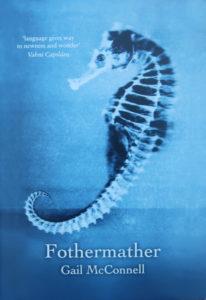
Gail McConnell – Fothermather (Ink Sweat & Tears Press)
Judges’ Comments
What is astonishing here is how perfect form and subject meet. Formation is in fact the subject of these poems – the literal formation of children, and the formation of parents in their gendered roles. As an exploration of queer parenthood, this pamphlet feels timely, but never contrived. Rather, it pulses with lived experience, with what matters deeply, and as the poems form and unform, construct and deconstruct in our reading of them, we sense the even more important and sometimes magical composition happening behind the poems – that of fothermather, of parent.
Shell Notes
Parented by ‘Notes Toward a Shellfish’, C.K. Williams’ translation of Francis Ponge, ‘Notes Pour un coquillage’. ‘Shell Notes’ is a rearrangement of this source.
Look — this multi-chambered skull is spectral
at sea. It shelters (and gives pleasure as a dwelling
to) a not-too-social mollusk. Anything —
the amorphous to the form; what is colossal
to the small (the giant over David; the cathedral
to the dust) — any sort found differing
can make for uneasiness in a being.
Animal, fish and human like a shell.
Form is adapted from elsewhere (a residue
of that place it bears). Glass from sand, city
from stone, a well out of the ground, a statue
made of bone. Sculpted things, inconceivably
there, show through at last. Adjustment is true
genius. Less man from ape, than boy from body.
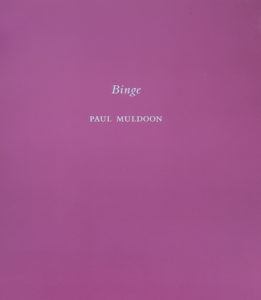
Paul Muldoon – Binge (The Lifeboat)
Judges’ Comments
The judges were delighted by the great energy and inventiveness of these poems, their formal and linguistic brio and the emu-like way they seem to digest almost any subject matter. Some poems address landscape and life in Northern Ireland, others address friends and alert us to wonders and strangeness around the globe. The poetry can be very much of the moment – the title poem is a fantasia on a week’s news stories from The Times –, but it also ranges back across millennia of culture and history. Along the way, deadly serious observations rub against genuinely funny jokes. Paul Muldoon may be a long established presence, but this pamphlet is wonderfully fresh.
A Ruin
It might have been a gristmill, a dilapidated granary or grange
I first drove by some sixty years ago
and, with my little eye, espied
through a door-frame the tousled ferns
and red-haired dockens
of kids my own age sent out to play in the snow,
their snowballs
so specific in the sprawl.
Windowless now, roofless, tucked
under the first, sheltering hill of a range
that ran all the way to Mexico —
a country into which we still hoped to ride
hell-for-leather, still hoped to adjourn
after the stick-up — this ruin betokens
not only the slo-mo-
mowing of a meadow for a shopping mall
but the fate that would befall
the many tagged and retagged
over those sixty years. The landscape is so marked by change,
the bungled peace process, the shoddy bungalows,
the wind farms taking us in their stride,
so marked by all the turns
things have taken
for kids now summoned back from playing in the snow,
the nettles almost as tall
as its dividing wall,
a ruin seems the only thing intact.
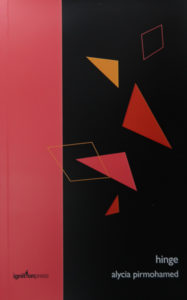
Alycia Pirmohamed – Hinge (ignitionpress)
Judges’ Comments
Alycia Pirmohamed impressed the judges with her ability to chart an emotional landscape of identity, stretched between the geographical poles of Canadian Alberta and Indian Kutch. Gaps and rifts of this terrain, as well as its bridges and crossings, are mapped with geometrical precision. Yet these lines are created to embrace what is blurry, tentative, elliptical; tenderness hovers over the view as a fog. The disorientation serves as a stepping-stone into another dimension: the poetry soars off the map and finds its metaphysical belonging in the vision of Allah, on the connection to whom Hinge hinges.
How to Say Dark
There is a young girl at the riverbank,
knees and hair wet.
Her body unhinges like a black bear’s mouth.
The salmon blink through
her every Ya Allah. There is no right answer
for how to feel peace.
She drifts in the water, a blur of girlhood
split too many times,
the ligament between korosho trees
and lodgepole pine. To a young daughter
in a teeming body of water, it is a shame
that nothing below the meniscus
has a name but her—
so she calls one fish plum for its bruised
brown colour. She names the wet ferns
ripple as they scatter around her thighs.
Even the water in evening churns differently
from daylight green.
It darkens, and she knows better than most
how to say dark.
The Michael Marks Publishers' Award Shortlist
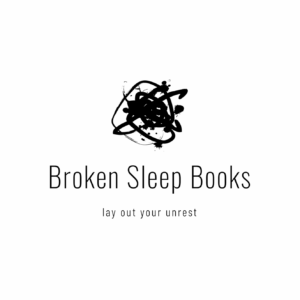
Judges’ Comments
A relatively new press on the scene, Broken Sleep Books storms onto this years shortlist not simply because of the quantity of its submissions (which is substantial) but the quality of that quantity. Here is an editorial hand and eye that seems to do right by its incredibly diverse authors. The books are marked by a kind of verve and vivacity – poets willing to risk a bit more, to say things a little louder, and an editorial hand that doesn’t unduly restrain but allows the diversity of voices and poetics to beautifully and elegantly be.
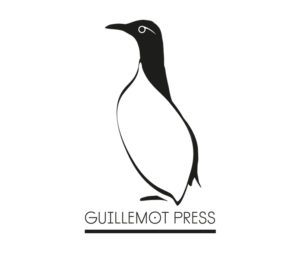
Judges’ Comments
Guillemot Press has been previously shortlisted for Publishers’ Award. The pamphlets that it produces are a pleasure to hold and to read: each one has a distinct sensory identity, with their different lovely (but sustainably produced) papers and playful variations in trim size. These beautiful pamphlets often feature explorations of relationship between text and image; in a broader sense, their exquisite physicality invites an embodied meditative experience of an immersion in poetry while being aware of the somatic experiences of reading, viewing and feeling. The judges were impressed by the sense of a sheer presence that Guillemot Press’ pamphlets project.
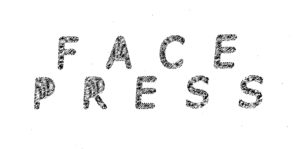
Face Press
Judges’ Comments
Every pamphlet submitted by Face Press was an individual event. Always, great care had been taken in thinking through how each aspect of the pamphlet’s appearance, from the cover, to the type, to the title page, might enhance the aesthetic effect of the poetry. Whether it be the sealed mirror-written pages of Timothy Thornton’s A Very Short Introduction to Ghosts, designed to give up their secrets only when illuminated by a torch, or the carefully sourced seeds embedded in the cover of J.H. Prynne’s Enchanter’s Nightshade, the pamphlets gave repeated examples of a highly productive partnership between the creativity of the poet and that of the publisher.
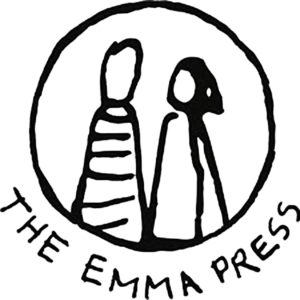
Judges’ Comments
The Judges were impressed by The Emma Press’s commitment to increasing accessibility and ways into the poetry world, both for writers seeking a nurturing platform through which to publish and develop creatively and for a readership of poetry both longstanding and new. Pamphlet publishing is currently the main focus of their operation. This year’s impressive entries showcase all three of The Emma Press’s pamphlet series (the Poetry Pamphlets, the Picks and the Art Squares), which are consistently beautiful and engaging productions, immediately recognisable through consummate design.
The Michael Marks Awards for Illustration and for Poetry Written in a Celtic Language will be announced at the online event on Monday December 14th


